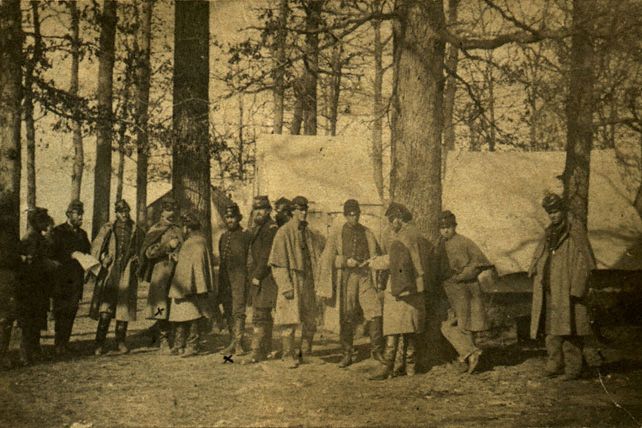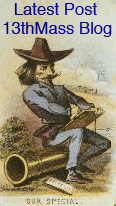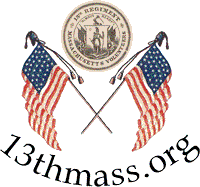“The Mass. 13th, Col. Leonard, have made their appearance. Judging from the number and animus of the Massachusetts regiment, it would seem that they were inclined to subjugate the entire South, without the assistance of any other State. New York, Indiana, Wisconsin and a number of other States may, however, dispute the claim to this honor." -A correspondent of the New York Herald, writing from Pleasant Hill, Md.

It cost a recruit $12.50 for the privilege of enlisting in the exclusive 4th Battallion of Rifles, but before considering the fee, the applicant needed to be approved by a vote from members of the Boston Militia group. In spite of the cost there were plenty of applicants & there was no problem filling each company to its full compliment of men. The four rifle companies of the Fourth Battallion, Companies A, B, C, & D, became the nucleus of the 13th Regiment Massachusetts Volunteers. For the most part these were Boston men from good circumstances, whose employers promised to hold their positions until they returned home from the war. They were educated and outspoken men. The other rifle companies that made up the 13th were from the surrounding towns of Roxbury, Natick, Stoneham, Marlboro, and Westboro. The regiment was mustered into federal service at Fort Independence, Boston, July 16th 1861. Colonel Samuel H. Leonard led the regiment through 3 years of hard campaigns which gained for them an enviable service record. Thirty four year old Leonard was a man of few words but had a clear booming voice and a reputation throughout Massachusetts as a drill master second to none.
The regiment, one thousand men strong, left Massachusetts for Maryland on July 30th 1861. Many of these men chose to go directly to the seat of war as privates in the 13th rather than wait for a chance at an officer's commission with another organization. Over 100 of them did eventually gain commissions in new organizations as the war dragged on. These men were competitive at everything.
They made a model camp at Darnestown, MD, adorned with two evergreen trees before each tent with a large archway covered with boughs before each company street. A picture of the camp made it into one of the weekly illustrated papers. They raced with the 12th Indiana Regt. over dusty Maryland roads to see who were the better troops at marching. With heavier packs the 13th won. At one Division inspection the brass buttons on their coats, and the brass eagles on their hats, shined so brightly a comical yellow glow cast itself over the regiment. "Brother officers and soldiers, I have been looking round all the morning to find some regiments to compare you with, but I haven't seen any. I wouldn't swap you for any regiment this side of Washington," said Colonel Leonard after the review. Riding away he added "I never felt so big in my life." This was high praise from their Colonel. The men were also outspoken and never failed to criticize an officer whom they felt deserved it, especially one outside their own ranks trying to interfere with their business.
"They are a damned insubordinate lot," said brigade commander General John J. Abercrombie when asked what kind of troops they were. General Irvin McDowell sneered and called them a 'bandbox brigade' after their habit of prinking for reviews; wearing paper collars and white gloves for the occasion. But they proved they could also fight.
"I am proud of them. I like to go into battle with them," Major Gould wrote to the ailing Col. Leonard the day after the battle of Antietam. "Hartsuff's brigade is complimented, how much praise must be awarded to the 13th who stood so long so bravely." They fought hard at 2nd Bull Run, Antietam, Fredericksburg, Gettysburg, and other places until the day they left the front lines at Petersburg in July, 1864, to return home to Massachusetts. This website is dedicated to their memory and to sharing the stories of the 13th Mass.
Copyright © 2008 by Brad Forbush. All rights reserved.


Home | About Us | History | Contact Us | Reciprocal Links | Search | Site Map